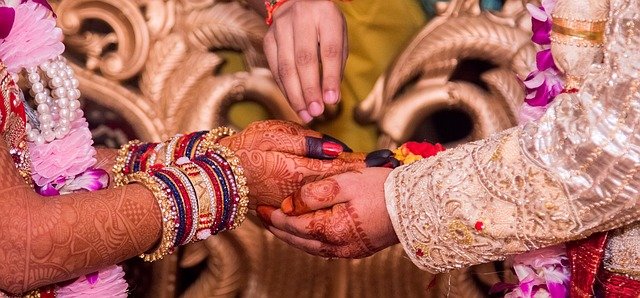
Marriage is a sacred bond between two individuals who commit to spend their lives together. The laws governing marriage in India have evolved over time and are primarily based on religion and personal laws. Marriage is an essential aspect of Indian society, and it is considered a sacred institution that binds two individuals in a lifelong commitment. India is a diverse country, and therefore, marriage rules vary based on religion, caste, and region. The rules and regulations governing marriages in India are rooted in traditional and cultural beliefs. In this blog post, we will delve into the various marriage rules in India and understand their significance. We will discuss the Hindu Marriage Rules, Muslim Marriage Rules, Christian Marriage Rules, and the Special Marriage Act. Understanding the marriage rules in India is crucial for anyone planning to get married or seeking to gain knowledge about the cultural and legal nuances of marriages in India.
Marriage is an integral part of Indian society and culture. It is viewed as a sacred bond that unites two individuals and their families for life. In India, marriages are steeped in tradition and are often elaborate affairs involving various ceremonies and rituals. However, while the cultural aspects of marriage are important, it is also essential to understand the legal framework governing marriages in India. The laws and regulations surrounding marriage in India vary based on religion, caste, and region. The Hindu Marriage Act, Muslim Personal Law, Indian Christian Marriage Act, and Special Marriage Act all provide for different rules and requirements for marriage. These laws govern various aspects of marriage, including the age of marriage, the consent of the parties involved, the validity of the marriage, and the registration of the marriage.
Understanding the marriage rules in India is crucial for anyone planning to get married or seeking to gain knowledge about the cultural and legal nuances of marriages in India. In this blog post, we will delve into the various marriage rules in India and provide a comprehensive guide to help you understand the different laws and regulations that govern marriages in India.
In this blog, we will discuss the various marriage laws in India and their legal aspects.
Hindu Marriage Act, 1955:
The Hindu Marriage Act is the most important law governing marriages in India, and it applies to Hindus, Jains, Sikhs, and Buddhists. The act provides for the registration of marriages and governs the conditions for a valid marriage. According to the act, a Hindu marriage is solemnized only when both parties are Hindu, and they perform the rites and rituals required for a valid marriage.
The act specifies the conditions for a valid marriage, which include the absence of any prohibited relationships, mental capacity, and age. The minimum age for marriage is 18 years for the bride and 21 years for the groom. The act also provides for divorce and maintenance, and it governs the inheritance rights of wives and daughters.
Special Marriage Act, 1954:
The Special Marriage Act applies to all citizens of India irrespective of their religion. The act provides for the registration of marriages and governs the conditions for a valid marriage. According to the act, a marriage can be solemnized between two individuals who are not related to each other and who are of marriageable age.
The act specifies the conditions for a valid marriage, which include mental capacity, age, and the absence of any prohibited relationships. The minimum age for marriage is 18 years for the bride and 21 years for the groom. The act also provides for divorce and maintenance, and it governs the inheritance rights of wives and daughters.
Indian Christian Marriage Act, 1872:
The Indian Christian Marriage Act applies to Christians in India and provides for the registration of marriages and governs the conditions for a valid marriage. According to the act, a marriage is solemnized only when both parties are Christian, and they perform the rites and rituals required for a valid marriage.
The act specifies the conditions for a valid marriage, which include the absence of any prohibited relationships, mental capacity, and age. The minimum age for marriage is 18 years for the bride and 21 years for the groom. The act also provides for divorce and maintenance, and it governs the inheritance rights of wives and daughters.
Muslim Personal Law:
Muslim Personal Law governs the marriage and divorce of Muslims in India. According to the law, a marriage is solemnized when both parties are Muslim, and they perform the rites and rituals required for a valid marriage. The law provides for the registration of marriages but does not make it mandatory.
The law specifies the conditions for a valid marriage, which include the presence of witnesses, the absence of any prohibited relationships, mental capacity, and age. The minimum age for marriage is 18 years for the bride and 21 years for the groom. The law also provides for divorce and maintenance, and it governs the inheritance rights of wives and daughters.
Parsi Marriage and Divorce Act, 1936:
The Parsi Marriage and Divorce Act applies to Parsis in India and provides for the registration of marriages and governs the conditions for a valid marriage. According to the act, a marriage is solemnized when both parties are Parsi, and they perform the rites and rituals required for a valid marriage.
The act specifies the conditions for a valid marriage, which include the absence of any prohibited relationships, mental capacity, and age. The minimum age for marriage is 18 years for the bride and 21 years for the groom. The act also provides for divorce and maintenance, and it governs the inheritance rights of wives and daughters.
Conclusion:
In conclusion, the marriage laws in India are diverse and are primarily based on religion and personal laws. The Hindu Marriage Act, Special Marriage Act, Indian Christian Marriage Act, Muslim Personal Law, and Parsi Marriage and Divorce Act are the primary laws governing marriages in India. These laws provide for the registration of marriages, govern the conditions for a valid marriage, and provide for divorce and maintenance. They also govern the inheritance rights of wives and daughters. It is important to understand these laws before entering into marriage in India to ensure a smooth and legally valid process.
Marriage Registration in Thane
Marriage Registration in Malabarhills
Marriage Registration in Cuffeparade
Marriage Registration in Juhu
Marriage Registration in Tardeo
Marriage Registration in Bandra West
Marriage Registration in Worli
Marriage Registration in Dadar
Marriage Registration in Byculla
Marriage Registration in Santacruz
Marriage Registration in Mahim
Marriage Registration in Vasai
Marriage Registration in Bandra East
Marriage Registration in Raigad
Marriage Registration in Andheri East
Marriage Registration in Ghatkopar
Marriage Registration in Bhandup
Marriage Registration in Mumbai Central
Marriage Registration in Kurla
Marriage Registration in Churchgate
Marriage Registration in lalbaugh
Marriage Registration in Navy Nagar
Marriage Registration in Dharavi
Marriage Registration in Nariman Point
Marriage Registration in Kalbadevi
Marriage Registration in Grant Road
Marriage Registration in Malad
Marriage Registration in Borivali
Marriage Registration in Dombivli
Marriage Registration in Palghar
Court Marriage Registration in Pune
Best Family Lawyer in Mumbai
Court Marriage Registration in Mumbai
Court Marriage Registratio in Thane
Court Marriage Registratioc in Pune
Court Marriage Registratio in Mumbai
Court Marriage Registratio in Nashik
Legal Service Provider in Mumbai, Thane, Pune
Marriage Registration in Mumbai
Court Marriage Registration in Mumbai



